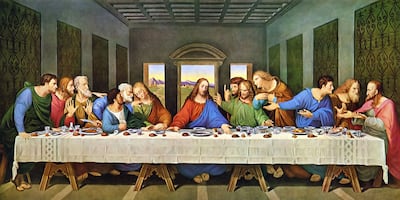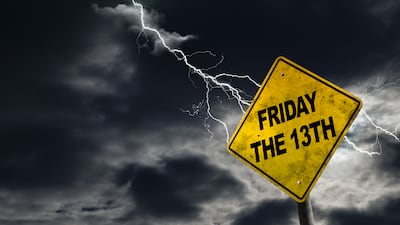Today marks the first Friday the 13th of the year, with a second to follow on December 13. The date is considered unlucky by some, akin to western superstitions such as not walking under ladders, being wary of black cats crossing your path and breaking a mirror.
The association between the number 13 and bad luck has a long history with roots in Norse mythology, Christianity and Greek gods. Its connection to Friday, however, has more opaque origins.
Why is a Friday unlucky?
Although historians generally agree the link between Friday and the number 13 wasn’t established until the 19th century, one particular Friday the 13th remains famous as the beginning of the end of the Knights Templar, back in the 14th century.
After centuries of building power and wealth, the downfall of the European monastic military order began in the early morning hours of Friday, October 13, 1307, with a series of arrests.
In the UK, Friday used to be known as “Hangman’s Day”, when those who had been condemned to death would be sent to the gallows. Cementing the day as an unlucky one was a novel by American businessman Thomas W Lawson, titled Friday, the Thirteenth, in which a broker capitalises on superstition to start a panic on Wall Street on Friday the 13th.
The fear of Friday the 13th is called paraskevidekatriaphobia.
Why is the number 13 unlucky?

Many cultures have superstitions centred on the number 13. According to folklore, the number gained its unlucky connotations in Norse mythology, owing to a story about 12 gods at a dinner party in Valhalla. Uninvited, Loki shows up as the 13th guest and persuades Hoor, the blind son of Odin, to shoot Balder, another of Odin’s sons, with a mistletoe-tipped arrow. Balder dies and the tragedy is associated with the number 13.
In Christianity, there were 12 disciples at Jesus Christ's last supper on Maundy Thursday, the night before his crucifixion. Judas Iscariot, the disciple who would betray Jesus, was the 13th man to take his seat.
Nods to the superstition can be found in modern culture, with many buildings and hotels omitting a 13th floor, going from 12 straight to 14, while some airlines do not have a row 13.
Tuesday the 13th and Friday the 17th are unlucky, too
In Hispanic and Greek culture, Tuesday the 13th is traditionally considered an unlucky day and is known as martes trece. In Greece, Tuesday is the day associated with Ares the god of war, and Constantinople, as it was then called, fell twice on a Tuesday: in 1204 during the Fourth Crusade, and in 1453 to the Ottomans.
In Italy, however, the number 13 is actually considered lucky, while Friday the 17th is the unlucky day. Alitalia, the country's airline, does not feature row 17 on its planes.
The connection between the number 17 and bad luck is owing to the Roman numerals for 17, XVII, which when rearranged create the word VIXI. The word translates as “I have lived”, the past tense of which implies death.
Can Friday the 13th bring good fortune?

Despite its reputation, the day can also prove lucky for some. Last January, one Dubai resident won a life-changing Dh15 million ($4.08 million) on Friday the 13th.
Russel Reyes Tuazon from the Philippines, a storekeeper for a Brazilian restaurant, scooped the grand prize in the Emirates Draw. Tuazon used his date of birth, age and the birthdays of his son, sister and mother among his choice of digits for the draw.
“When I came to this country as a teenager, I had no idea my life could change the way it did," he said following his win.

